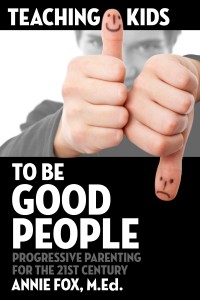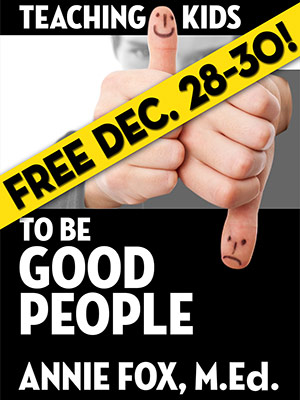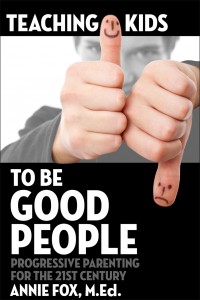|
|
February 28, 2013
As a published author, of course I know about book tours. Not that I’ve ever actually been on one, but I’ve attended other authors’ events at Book Passage. So, yeah. I understand the concept. What I didn’t get, until recently, is “What’s a blog tour?” Turns out it’s pretty much the same thing as a book tour without the books, the bookstore, or the fans eager to buy an autographed copy.
 Not all teachers are parents, but all parents are teachers Since I’ve got a new book I’m rather proud of and zero publicity budget, starting today, I’m on the (virtual) road with the Teaching Kids to Be Good People Blog Tour (Feels like we need a theme song. I’ll work on it.) At each of the nineteen stops along the tour, there is no stump speech. You, my dear readers, will be treated to totally new and thought provoking content to help us 21st century parents raise nice kids who also do good in the world.
Here’s where you can find me and when:
 I know it's a virtual tour, but I want this bus! Teaching Kids to Be Good People Blog Tour Itinerary
Got the T-shirt:
February 28 – Suzanna Narducci’s blog at TweenParent.com
February 28 – Heather Chauvin’s blog (video interview)
March 5 – Kelly Hirt’s blog My Twice Baked Potato
March 7 – Jean Tracy MSS’ Parenting Skills Blog
March 10 – Jeanne Demer’s The Ruby Books
March 16 – Rick Ackerly’s blog at Genius in Children
March 18 – Margit Crane and Barbara Dab’s Good Enough Parenting Radio Show
March 18 – Sharon Silver ‘s blog at Proactive Parenting
March 19 – Families Magazine Southwest (UK)
March 20 – Sue McNamara at 6seconds.org
March 21 – Kristen Ploetz’ Little Lodestar
March 27 – AK Stout & Deb Evans‘ Social Geek Radio 6 pm (PT)
March 28 – Bruce Sallan’s #DadChat “Doing the right thing is good karma” (on Twitter) 6 PM (PT) Enter TweetChat room
March 29 – Lynnee Jimenez’s ClubChicaCircle.com
April 1 – Melissa Wardy’s blog at PigtailPals
April 8 – Keith Rispin’s Parenting Old School blog as well as Keith’s Ed Tech blog
April 15 – Carrie Goldman’s blog Portrait of an Adoption
April 19 – Sarah Newton’s blog at Sarah Newton.com
April 29 – Dr. Laura Markham’s blog at Aha Parenting
A big thank you to all my blog tour hosts. These are top-notch folks. All of them are authors, educators, clinicians, and/or parent coaches who do truly excellent work supporting kids, parents, and families. I’m honored to be on the same team with each of them and I encourage you to explore their books and services. We’re all here together to help each other as we help our kids.
OK, the blog tour starts now. Wait!! How’s my hair look? Oh, right. It doesn’t matter. :O))
Happy Parenting! (And if you feel the urge, please sign the guest book.)
 We're in this together!

January 6, 2013
 Many paths lead outward I’m beginning my work on a new book (not sure yet if it will be adult fiction or non-fiction). The theme: an exploration of how some people manage to respond to debilitating loss in exemplary ways. Because, throughout life, we are subject to many losses, how can we use the experience in a positive way? We may lose:
- a parent or other precious family member
- an opportunity
- our peace of mind
- our sense of community
- something into which we have put tremendous physical/creative effort
- the love of our life
- our best friend
- our job
- a physical or mental ability (due to illness or injury)
- our home
- our reputation
- our fortune
- our confidence
- our way
- ??
What happens after we suffer a major loss? Some people feel the pain so intensely they carry a permanent wound that limits them in the way widowhood limited my mother. For decades her suffering prevented her from fully reconnecting with the joy and creative force of life. Maybe you know someone like that. It is sad. I do not believe it is necessary.
When we experience a loss it is normal and healthy to grieve. It is also normal and healthy to heal. But how do we begin that process? That’s what this book is going to be about. We each have within us a breakable heart and spirt. We also have within us, the resilience needed to rebound and rebuild. If we can find ways to move beyond our suffering, loss can be fertile ground for positive transformation. We can become stronger in every sense of the word. We can develop greater compassion. We can forge the tools and the will to help others who are suffering from losses of their own.
The journey from loss to a new level of wholeness can be extremely challenging. Subsequent (lesser) losses may set us back. Which is why many of us do not fully recover from a major loss. But there are many people among us who’ve successfully made that transition. Gabby Gifford, Tammy Duckworth, are two women who immediately come to mind. There are many others who’ve achieved national and international recognition for their courage in the face of loss. There are also people in every community who have found their own path that has taken them beyond their losses to a new level of peace of mind and purpose. This book will explore some of the many ways people have transformed their lives after loss and how each of us can use the example of their lives to transform our own.
I would be very honored to hear from anyone who has successfully managed to transition out of a major loss (or from anyone who is currently in the process of doing so). If you know someone whose journey from loss has inspired you, I’d love to hear about it.
Please post your comments and we can learn together. I’m sure my exploration of this topic and the book that grows from it will benefit greatly from your input.
Thank you.
In friendship,
Annie

December 28, 2012
 FREE download for December 28-30, 2012, ''Teaching Kids to Be Good People'' by Annie Fox, M.Ed. Today (12/28) through Sunday (12/30), we’re giving away the Kindle version of my new parenting book Teaching Kids to Be Good People: Progressive Parenting for the 21st Century.
No Kindle? No problem. Download the ebook anyway because you can read it just fine on your PC, Mac, iPod Touch, iPhone, iPad, Android, Blackberry, and Windows Phone 7 with Amazon’s free Kindle Reader app.
Not in the US? Here are the Amazon links for Canada, UK, Australia, Brazil, France, Germany, Italy, Japan, Spain
Please accept this ebook as my gift to you and your family. Interested in the print edition? Learn more here.
Best wishes for a happy, healthy New Year, from our home to yours.

December 26, 2012
My friend and digital kids’ author, Karen Robertson, whose work includes the Treasure Kai series plus the Author’s Guide to Book Apps, contacted me about “The Next Big Thing.” Essentially it’s a “blog chain” for writers to help fellow writers get some buzz about their latest books and/or upcoming projects. Anything that helps me promote my work and simultaneously allows me to shine a light on other people’s writing sounds like a winner. “Sure!” I told Karen. “I’m in.”
She sent me 10 questions to answer. She’s linking to my blog from hers and, in turn, I’m supposed to link to the blogs of writers to whom I’ve reached out. Only one snag. At the moment, none of the 10 writers I’ve pitched the idea to have responded to me. I chalk it up as part of a well-deserved holiday slacker attitude. (Not even sure why I’m blogging today, except that I promised Karen and I’m big on keeping agreements.) When my writer friends get around to reading the email I sent them a week ago and decide to jump into The Next Big Thing, I’ll update this blog and link to their sites. In the meantime, here are my answers to the 10 questions. It was fun to answer them. Hopefully, you’ll find something interesting in what I have to say here.
 We can't parent without a game plan. Here's a good one. 1) What is the title of your latest book? Teaching Kids to Be Good People: Progressive Parenting for the 21st Century. It was published in October, 2012.
2) Where did the idea come from for the book? Well, we sure need more good people in the world. Can’t have too many of them… ever! But right at this point in history, I’d say we’re dealing with a world that is speedier, noisier, and in many ways more “I, Me, Mine” than ever before. Good people are desperately needed. Definition of a good person? Well, in my book… (and this is my book) a good person is one who looks for opportunities to do good in the world and has the social courage to act on those good intentions.
3) What genre does your book fall under? Non-fiction, parenting. But on a much broader level, this is a book about emotional intelligence and the tools to resolve issues from our own childhood so each of us may move forward toward a healthier relationship with ourself, our parents, our children, and everyone else. This may actually be a book about creating world peace. (Wow, that was a bigger answer than the “genre” question, wasn’t it?)
4) What actors would you choose to play the part of your characters in a movie rendition? I get that this question was devised for fiction writers, but I’ll take a sincere crack at it. Since the basis of my book is 32 personal essays, I’d say the best person to play the lead character in the movie rendition of Teaching Kids to Be Good People would have to be me. But I could totally do it! I was voted Class Actress in high school and I’ve done tons of community theatre. I already know all the lines, so I’m ready!
5) What is the one-sentence synopsis of your book? We desperately need more good people and they’re going to come from parents with a game plan. Teaching Kids to Be Good People is the game plan. (OK, that was two sentences. Sorry.) Here’s a free excerpt of Chapter 1, just to give you a taste of what this is all about.
6) Was your book self-published or represented by an agency? Electric Eggplant (which is my husband, David Fox, and me) published Teaching Kids… So, the answer is self-published. And I say that with no small amount of pride. The book looks and reads like the professional product it is.
7) How long did it take you to write the first draft of the manuscript? About a year, though many of the essays were originally written in other forms within the past five years. Two-thirds of the book is brand new content. Even with the “older” stuff, I had to get in there and re-work each essay because a) I’m a compulsive editor and b) I’m a better writer than I was when I first wrote them. I’ll be a better writer tomorrow than I am today. If I were to revisit this book a year from now, I’m sure I’d find ways to take it to still another level. But at some point you have to say, “This is good. I stand by it as is.” And then you put it out there in the world. I’m gratified by the enthusiastic reviews the book has received so far.
8) What other books would you compare this story to within your genre? There are hundreds of top-notch parenting books out there, with more coming to market each month. It’s a very competitive genre to be publishing in. Many of these books are written by MDs, and PhDs and are very helpful to very specific parenting challenges like: parenting kids with special needs, parenting adoptive kids from “hard” places, step-parenting, etc. My book is for all parents who recognize that their #2 objective (after keeping their children safe and healthy) is to help kids develop into people of good character.
9) Who or what inspired you to write this book? I’ve been answering email questions from tweens and teens since 1997. More and more of their questions reflect a huge gap in their understanding of how to treat themselves and others with compassion and respect. I wrote the book because kids have told me (in so many words) that they need tools to help them develop a moral compass. I wrote the book to help parents help their kids on their journey into young adulthood and beyond. A big part of the challenge parents have is in the area of communication. We wrongly assume that adults and kids mean the same thing when we use words like “fair” “mean” “love” “trust” “friendship.” That ain’t necessarily so. Parents need to do whatever it takes to get on the same page as their children (no small feat when our kids spend 24/7 mind-melded with their peers). My book offers parents new ways to see 21st century life from the eyes of their kids and provides guidelines to Conversations that Count. We need to listen to each other so a kid’s perspective is part of every parent’s frame of reference and a parent’s perspective is part of the mix inside a kid’s head when s/he is making choices amongst peers.
10) What else about the book might pique the reader’s interest? Read it and you’ll learn more about yourself and your kids. Then you’ll be able to use what you learn to be the kind of parent you have always wanted to be.
 — Older Posts »
| |

















